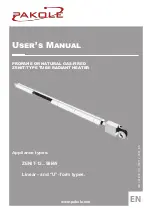
www.desatech.com
118997-01B
6
Figure 4 - Typical Generator Grounding
Method (Generator construction may
vary from that shown)
Ground Lug
Ground Wire (#10 AWG
- Stranded-Copper)
Alternator
Copper
or Brass
Grounding
Point
OPERATION WITH
PORTABLE GENERATOR
WARNING: Before operating
heater or any appliance from a
portable generator, verify that
generator has been properly
connected to earth ground. Im-
proper grounding or failure to
ground generator can result in
electrocution if a ground fault
occurs. Refer to owner’s manual
supplied by generator manu-
facturer for proper grounding
procedures.
The operating voltage range of the heater is
108 to 132 Volts (120 Volts +/- 10%). Prior
to plugging heater into generator the output
voltage should be verified (if generator is
equipped with the automatic idle feature, the
output voltage should be measured with the
generator running at full speed). If the voltage
does not measure in this range the heater
should not be plugged into the generator.
Refer to
Operation
, page 5, for starting, stop-
ping and resetting heater procedures.
STORING,
TRANSPORTING OF
SHIPPING
Note:
If shipping transport companies require
fuel tanks to be empty.
1. Drain all fuel from fuel lines and pump/filter
(see
Fuel Filters
, page 14).
2. Clean
and
flush fuel filter in fuel pump if
equipped (see
Fuel Filters
, page 14).
3. Remove drain plug and drain fuel tank.
4. Replace drain plug.
5. If any debris is noted in old fuel, add 1 or
2 quarts of clean kerosene to tank, stir
and drain again. This will prevent excess
debris from clogging filters during future
use.
6. Replace fuel cap or drain plug. Properly
dispose of old and dirty fuel. Check with
local automotive service stations that
recycle oil.
7. Add two gallons (350,000 Btu/Hr) of clean
kerosene or #1 fuel oil to fuel tank.
8. Replace fuel cap.
9. Operate heater for 5 minutes (see
Opera-
tion,
page 5).
10. Stop heater and let cool completely.
11. Remove drain plug and drain fuel tank.
12. Replace drain plug.
13. Properly dispose of old and dirty fuel.
14. If storing, store heater in a dry location.
Make sure storage place is free of dust
and corrosive fumes.
IMPORTANT:
Do not store kerosene over
summer months for use during next heat-
ing season. Using old fuel could damage
heater.







































